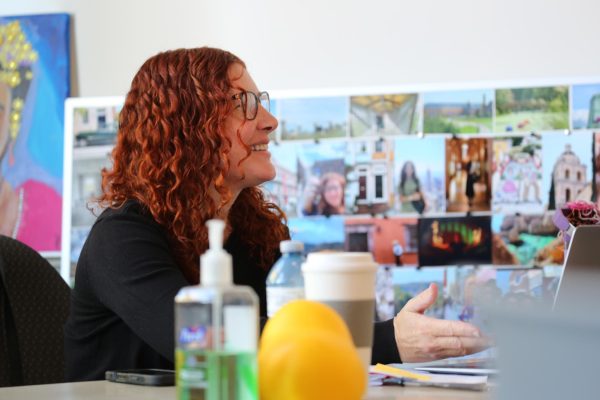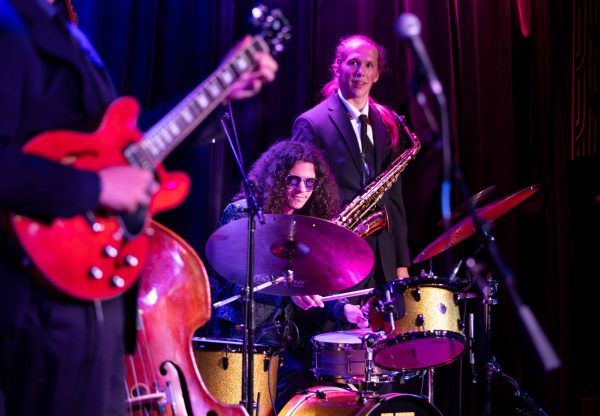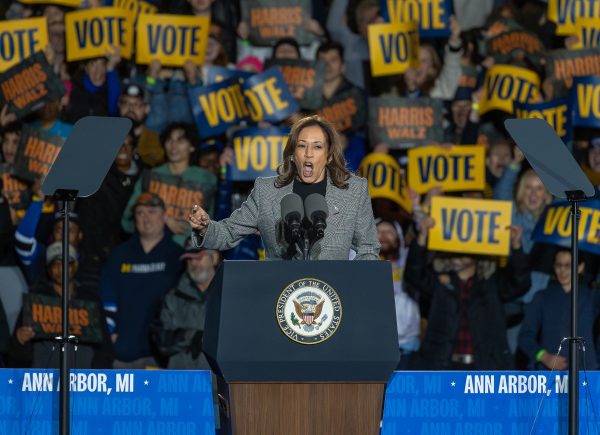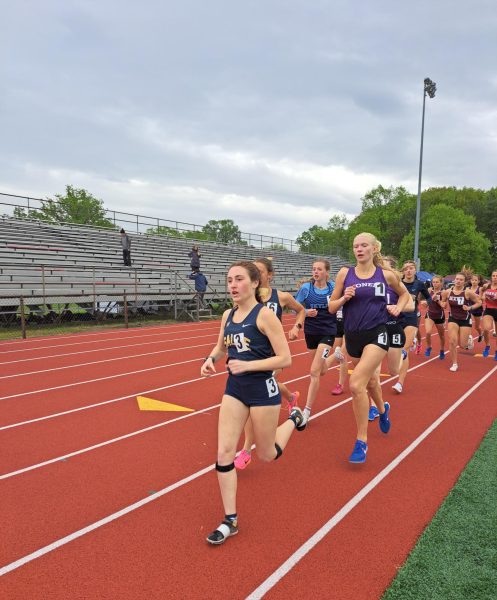New Faces for AAPS Board of Ed
An experienced lawyer, an involved parent, and a retired teacher join forces to bring change to the school board.
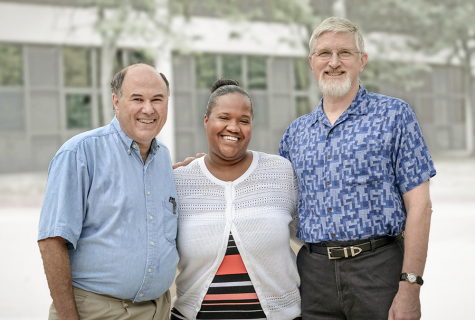
From left to right: Jeff Gaynor, Harmony Mitchell, Hunter Van Valkenburgh.
When Hunter Van Valkenburgh, a lawyer and former teacher, ran for school board in 2014, there were 10 people competing for four open seats. With support from parents and students at Ann Arbor Open, where Van Valkenburgh’s two children attended and his wife teaches, he placed fifth. Instead of giving up, Van Valkenburgh waited for the next school board election to run again, this time on a slate with two other involved community members.
Jeff Gaynor was the first to team up with Van Valkenburgh. Recently retired from teaching at Clague Middle School, Gaynor had the valuable perspective of an Ann Arbor teacher to add to the slate. Harmony Mitchell completed the trio, a parent of four kids, three in the Ann Arbor Public Schools and one who will go when she’s old enough. The team began campaigning quickly, with “Hunter, Harmony and Jeff” signs appearing on front lawns by August.
What sets the three of them apart from other school board candidates is not only that they are running on a slate, but their platform. While each candidate has a different order of priorities, the team agrees that there should be more public discussion and transparency in board meetings, less standardized testing and a budget that focuses on hiring teachers and reducing class sizes. They agree, in short, that Ann Arbor Public Schools needs change.
“I moved here about 5 years ago, and my initial interactions with AAPS were great,” Mitchell said. “But I started to notice some things that happened in Washington DC that are starting to happen here, the privatization of pretty much everybody that works in the schools, and I started to notice that one test a year became two, and then two to three, and I noticed that my children weren’t being taught the things that, I, at least, was taught at school, and that they were now being taught to a test. And a greater part of why I’m running is because I come from a community that doesn’t get heard very often. Their voice is muffled by lots of people who have more money and it’s oftentimes that we are just drowned out. Our opinion and what matters to us just does not get heard.”
Public Discussion in Meetings
An important aspect of the Hunter/Harmony/Jeff campaign is their commitment to making it easier for the Ann Arbor community to voice concerns or ideas at school board meetings. As it is now, public commentary is a small portion of the meeting’s agenda. The more people who have something to say about a popular topic, the less time each person has to make their case. Meetings have often gone late into the night and early morning, and although there is a limit to how long they can run, a vote of the board can override this rule. Commentary is not scheduled first on the agenda, so attendees may have to wait through hours of promotional videos and student award recognition before having a chance to speak. After commentary, board members sometimes address issues brought up but sometimes just continue with the scheduled topics.
“If there’s an issue that’s a hot-button issue, people should be allowed to speak and voice their opinions,” Mitchell said. “There should be dialogue between the board and the public, and that’s not happening at the board meetings. I would definitely lobby that we make some adjustments to the start times, possibly also have more time for public input and response from actual board members, instead of just the three minute commentary and then the board member not really acknowledging what people have to say and then moving on to what they have already decided before they count which way they’re going to vote.”
“One idea that I had, that I would certainly try to implement, would be to change the bylaws to get a group of parents or students or workers, or some group that has as a particular issue, that gets a certain number of [signatures on a petition], we could argue about the numbers may be, 50 or 100 or something, then they would actually be given time on the agenda to have a representative of their group speak for all of them, so that there would actually be a dialogue,” Van Valkenburgh said.
Overtesting
The movement against standardized testing is strong in Ann Arbor. In fact, Ann Arbor STOP, or Stop over-Testing Our Pupils, is a group on Facebook with over 200 members. The concern is that teachers are no longer given enough freedom to plan lessons that will help their students. Instead, teachers are forced to teach to a standard curriculum that prepares students to do well on the many standardized tests they take throughout the year. Teachers are evaluated based on their students’ test scores, so they have to concentrate on test preparation over everything else. The tests themselves also take up valuable class time. Protesters of over- testing believe there are better methods of student and teacher assessment.
“Teachers used to be considered professionals,” Gaynor said. “We had the autonomy to teach our students as long as they produced results. Now, it’s being scripted. We don’t talk about kids anymore, we talk about data.”
This dissatisfaction with the school district’s tests produced a movement of parents choosing to keep their kids out of the test taking. The students would work on something else while the test was being given or stay home from school that day.
“We have a difference with the board there too,” Van Valkenburgh said, “Because when there was a significant opt-out movement at various schools, mostly Ann Arbor Open, the board’s response, instead of writing to the state board and saying, ‘We have problem with the MSTEP, and we have number of parents who have such a problem with it that they’re having their students opt-out,’ our board decided, ‘We have to figure out how [to] force these students to take this, and we will threaten to kick them out of Open, Community, STEAM, Pathways… we will just revoke that privilege if you opt-out of the MSTEP.’ So in our opinion, they did the opposite of what they should have done. Instead of joining the protest, they decided to punish the protestors.”
The MSTEP is the Michigan Student Test of Educational Progress. It is a compilation of the required testing in Michigan, from state English and math tests to the free SAT provided at school. Notably missing from this is the NWEA, Northwest Evaluation Association, one of the biggest tests kids take in Ann Arbor before high school.
“NWEA is optional,” Van Valkenburgh said. “It’s something the district pays for, just because the district wants data. [The test] is supposed to allow teachers to create individualized learning plans for students. But it’s not supposed to be for teacher evaluation. It’s not really supposed to show student growth. But that’s what the district has been talking about using it for anyway.”
The district is mandated by the state to use some type of assessment of student growth, but it is not required to be a standardized test. One of the biggest issues in the school board right now is the budget, or lack thereof. The NWEA is one thing that Van Valkenburgh would eliminate in order to focus on other things.
Budget
Although Rick Snyder and his administration will claim otherwise, Michigan’s public education funding cuts have been crippling. According to a study by the Center of Budget and Policy, Michigan had the 12th worst state funding cuts in the country between 2008 and 2016, when the per-student allowance dropped 7.5 percent.
“Yeah, money is a real serious issue,” Gaynor said. “I mean, it just is. It’s affecting every district in Michigan. And if we don’t make some changes in Lansing it’s going to continue. I don’t think we have answers for that. It’s how we’re going to juggle it.”
For Van Valkenburgh, Michell, and Gaynor, the highest priority in spending is hiring more teachers in order to reduce class sizes. “And that’s the mantra,” Van Valkenburgh said.
Parents’ Perspective
Van Valkenburgh has twins who are sophomores at Community High School, Elena and Garnet Bernier. Mitchell has three kids in the AAPS system, at four different schools, including Ariel Mitchell, a freshman part-time at Community. Gaynor’s kids are grown but attended Ann Arbor Public Schools. All three of them know what it’s like to raise kids in our school system. For Mitchell, the biggest concern as a parent is transportation.
“Transportation is a huge issue,” Mitchell said. “I know my daughter… well, she catches the bus from Pioneer to Community in the mornings. But still, in the afternoons I have to pick her up, every day. And the buses have often been overcrowded, and I have witnessed students sitting on the floors, on people’s laps. It’s not safe. That bus gets into an accident and you have so many liabilities. So many children hurt, it’s just a mess.”
For Sharon Simonton, another Community parent who has been working on the Hunter/Harmony/Jeff campaign, she’s glad to hear candidates talk about the issues she cares about. Many of her worries align with the trio’s priorities.
“They’ve addressed many of the concerns that I’ve had over the last couple years attending board meetings,” Simonton said. “I’ve become increasingly concerned by lack of transparency, with many decisions being made after midnight, and concerned by privatization, and the increased standardized testing of students, and just concerned by the lack of communication between the Board of Ed and the public, a lack of dialogue and conversation.”
Bringing it Home
Simonton believes all Ann Arbor public school students have a stake in the school board election.
“I think you should care because many of the decisions by the Board of Education directly affect all of the schools in our district, and the educational offerings that are available to you, and the conditions of your classrooms, your transportation to school, the teachers you have, and the amount of testing that you’re subjected to,” she said. “I think that students should consider supporting Hunter, Harmony and Jeff because they really are open to dialogue on these issues, and [are] really creating momentum to try to improve conditions for public schools in Ann Arbor that will then make the schools better for all students.”
Community students have another reason to be interested in this election, in that our school is different and therefore can be a topic of disagreement. The Hunter/Harmony/Jeff campaign has support from Ann Arbor alternative education advocates, and in turn, they are supportive of the alternative schools. Community High School is a program they would defend.
“I think that Community is the high school jewel of the district,” Van Valkenburgh said. “Major awards that our students get [are] because they are going to Community. Your newspaper, the jazz band, other programs, they bring in, they give prestige to the district.”
“I’d want to make other places more like Community,” he said.






